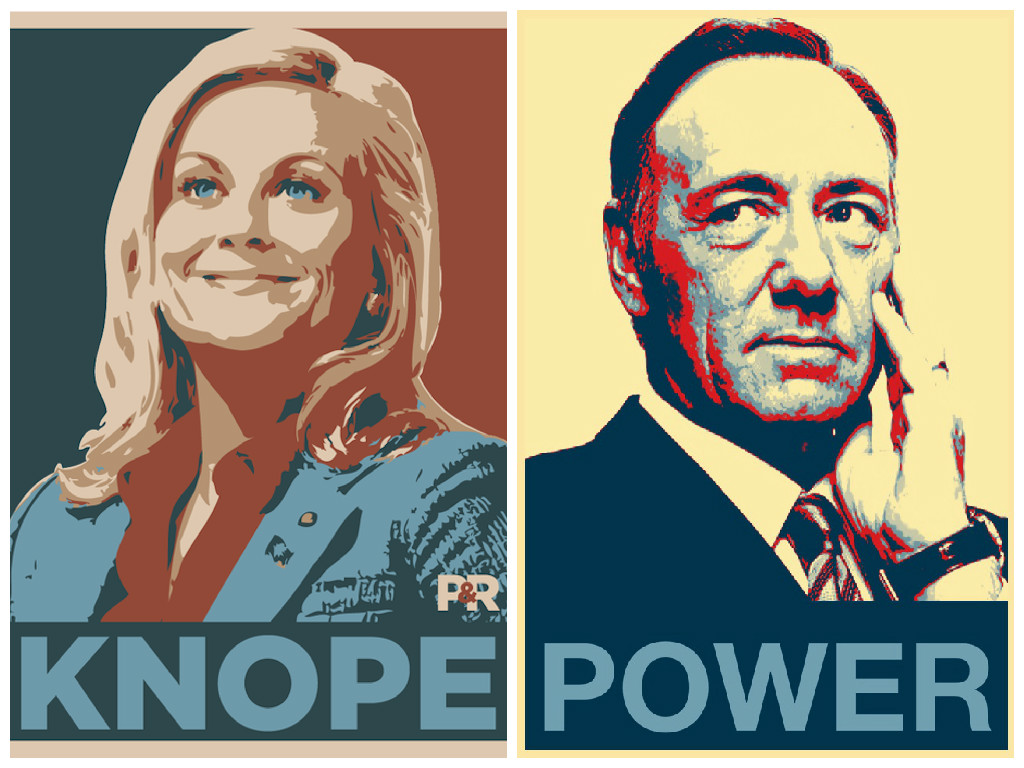Examining the uncanny similarities between Netflix’s House of Cards and NBC’s Parks and Recreation (may it rest in peace)
“I love that woman,” he said of his wife. “I love her more than sharks love blood.” The man was Frank Underwood, the show was House of Cards, the episode was the first in the series, and the line was over the top, so I laughed. Little did I know that Frank would prove to be a shark himself! LOL.
Anyway, three seasons into the series, I can’t deny that I’m a fan, but I also think the show’s critics make good points. For example, Jeb Lund writes for The Guardian that disbelief “must not be suspended so much as hung, drawn and quartered” while watching House of Cards. It’s a fittingly violent appraisal for a show with a weirdly high kill count, but Lund isn’t concerned about the violence as much as he is with the dubious politics at play in Frank’s “America Works” program, which involves gutting entitlements to achieve the unlikely goal of universal employment. But Lund shouldn’t be so upset.
From the beginning of its run, House of Cards has glossed over the policy in politics and cut straight to the theater. Real-world politicians may present their ideas in simplified terms to make them easier to digest, but President Underwood can’t make his policies palatable because they’re grounded in fantasy. All he can do is deliver them with bravado. It doesn’t matter whether you understand his plans or not as long as you appreciate the stakes. House of Cards has never been or tried to be The West Wing.
If anything, the political drama resembles Parks and Recreation. Netflix posted the new season of House of Cards online only a few days after the series finale of Parks, making the shocking similarities between the shows impossible to ignore.
America Works is Exhibit A because it bears a striking resemblance to Entertainment 720, the entertainment media conglomerate that Tom Haverford and Jean-Ralphio Saperstein founded in Parks. America Works is the ostensible panacea for the country’s economic woes, just as Entertainment 720 claims to be the “one-stop shop” for all of your entertainment media conglomerate needs. What’s more, Frank, Tom, and Jean-Ralphio all attempt to utilize the power of spectacle in promoting their endeavors. To push America Works forward, Frank organizes a massive July Fourth kickoff with the mayor of DC, inviting thousands of unemployed residents looking for a job to line up and sign up for one that the government can only temporarily subsidize. In Parks, Tom and Jean-Ralphio rent out a warehouse, furnish it luxuriously, print their own money, and surround themselves with professional basketball players to project the illusion of success in spectacular fashion before their kingdom inevitably collapses. America Works and Entertainment are both style over substance. They are both built to fail.
House of Cards and Parks also share a focus on calculated power couples. When Pawnee’s Deputy Parks Director Leslie Knope reveals that she is in a relationship with Deputy City Manager (and her superior) Ben Wyatt, the couple faces accusations of corruption. Similarly, when President Underwood makes his wife Claire the new U.N. Ambassador in an effort to give her some of the official power for which she has yearned, the couple faces accusations of nepotism. We’ve always known that Frank and Claire were rule breakers, but most of us have overlooked the inspiration they found in Leslie and Ben. Later in Parks,the Pawnee politicians turn their partnership into a well-oiled political machine that helps them maximize their influence: the former is elected Governor of Indiana, the latter Pawnee’s congressman. In House of Cards, Claire ultimately vacates her U.N. post so Frank can successfully secure a deal with Russia, effectively strengthening his presidential campaign and promoting the survival of the Underwood brand. Leslie, Ben, Frank, and Claire have all pursued power for themselves as well as for their respective empires.
Finally, House of Cards takes on another Parks trademark: Garry Gergich. For the uninitiated, Garry is a character defined by his uselessness and propensity to embarrass himself. Within Pawnee’s Parks Department, he is the butt of all jokes, so disrespected that his coworkers address him by various incorrect names throughout the series, including Jerry, Larry, and Terry. In House of Cards, Vice President Donald Blythe is our Garry. The likeness establishes itself as early as the first season, when Frank describes then Representative Blythe as a “martyr” who craves “a sword to fall on.” This is a clear allusion to the season two Parks episode “Park Safety,” when Garry craved a breakfast burrito he dropped in the creek and fell into that creek pursuing it. The most recent season of House of Cards amplifies the resemblance as Frank ridicules the man he has named VP, explaining that he’d rather have him causing problems in the White House than in Congress. “God help us,” Frank says to the possibility of Blythe succeeding him should he die on the job. On top of all that, when Russian President Viktor Petrov calls on the VP at a diplomatic dinner to deliver a toast, he fumbles, barely able to form a coherent thought. Look out for “Ronald” Blythe in the show’s fourth season.
Parks ended its run as fresh as ever with a finale that offered a glimpse at characters’ lives decades into the future. It was an original and deeply satisfying sendoff for characters we had come to love over the course of seven seasons. Meanwhile, in its third season, House of Cards continues to boast bloodthirsty protagonists, breakneck plot development, and a few killer one-liners (SHARKS!!!), but it repeatedly betrays its staggering debts to Parks. Time will tell whether or not Netflix’s baby can ever truly become its own show.

